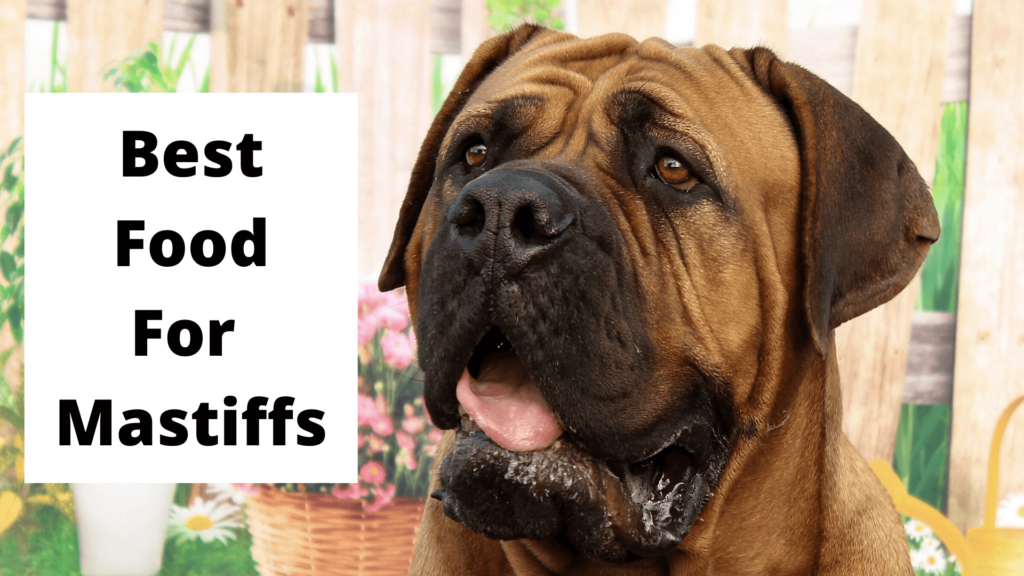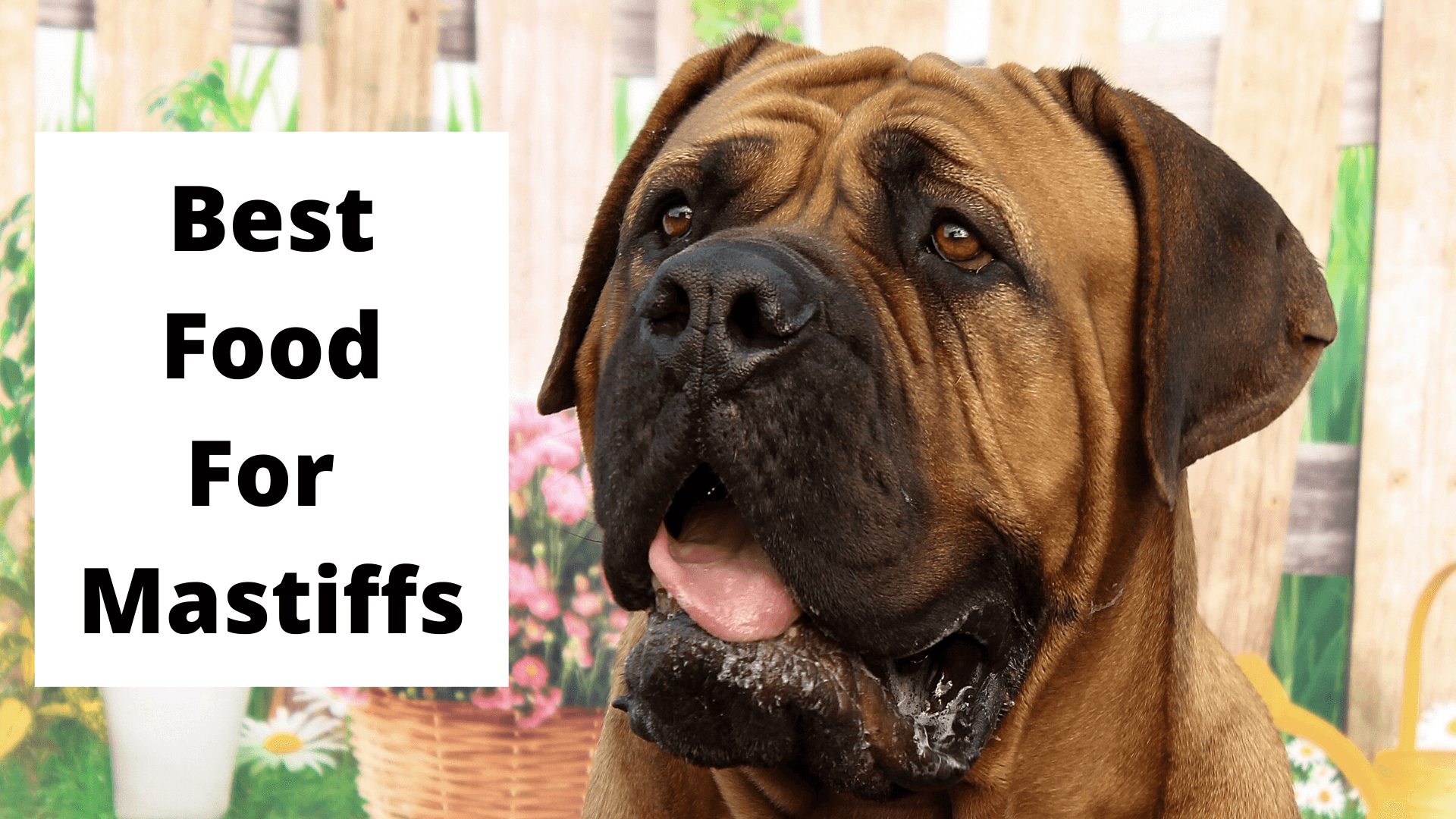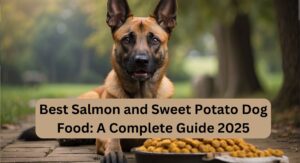If you are looking for the The Best Dog Food for Mastiffs, then you have come to the right article Mastiffs, with their majestic size and gentle demeanor, are one of the most iconic dog breeds. Their large frames and unique nutritional needs require a carefully tailored diet to ensure they remain healthy and active. Choosing the best dog food for mastiffs can be daunting, given the myriad of options available on the market. This guide will delve into the essential factors to consider, specific dietary needs, and top dog food recommendations for your furry giant.

Understanding a Mastiff’s Nutritional Needs
Mastiffs are a giant breed, with adult males weighing 160 to 230 pounds and females 120 to 170 pounds. Their size presents unique dietary challenges and requirements.
1. High-Calorie Needs
Mastiffs, given their large size, have specific dietary needs that must be met in order to maintain adequate energy levels for their daily activities. A diet that is rich in calories is essential for supporting their overall health and vitality. However, it is important to exercise caution when feeding them, as overfeeding these dogs can lead to obesity. This excess weight can further exacerbate existing joint issues, making mobility more challenging for them, and can also significantly shorten their lifespan. Therefore, it is crucial to find a balance in their food intake to promote a healthy lifestyle while avoiding the pitfalls of overnutrition.
2. Joint Health
Large dog breeds tend to be more susceptible to a variety of joint problems, including conditions like hip dysplasia and elbow dysplasia. These issues can significantly affect their mobility and overall quality of life. To help maintain and promote joint health in these larger dogs, it is beneficial to include foods that contain beneficial ingredients such as glucosamine and chondroitin. These compounds have been shown to support and strengthen joint function, making them a wise addition to the diet of large breeds.
3. Protein Requirements
Protein plays a crucial role in the processes of muscle growth, development, and repair. It is important to ensure that individuals incorporate high-quality protein sources into their daily diet to support these functions. Foods like chicken, beef, and fish are excellent options that should serve as a fundamental part of their nutritional plan. By prioritizing these protein-rich foods, one can significantly contribute to overall muscle health and recovery, helping to maintain strength and enhance physical performance.
4. Controlled Calcium and Phosphorus
Having excess amounts of calcium and phosphorus in the body can potentially cause significant skeletal issues, particularly during crucial growth phases when the body is developing. It is essential to maintain balanced levels of these minerals to prevent a range of developmental problems that can arise from their imbalances. Ensuring that the intake of calcium and phosphorus is properly regulated is vital for promoting healthy bone growth and overall skeletal integrity throughout this important stage of development.
5. Digestive Sensitivity
Mastiffs, like some other large breeds, can be particularly susceptible to a serious condition known as bloat, which can pose significant risks to their health and may even be life-threatening in certain cases. It is crucial for owners to be aware of this risk and take preventive measures. Implementing diets that are specifically formulated to enhance digestion can play a vital role in mitigating this issue. Additionally, adopting feeding practices that discourage dogs from gulping their food is essential in helping to reduce the likelihood of developing bloat. By being mindful of both food choices and feeding habits, owners can better protect their Mastiffs from this potentially dangerous condition.
Key Features to Look for in Mastiff Dog Food
1. High-Quality Protein
- Choose a food that features meat as the main ingredient.
- Target 22-26% protein for adult food and up to 30% for puppies.
2. Healthy Fats
- Incorporate omega-3 and omega-6 fatty acids for healthy skin and coat.
- Fat content should range from 8% to 14%, depending on activity level.
3. Controlled Minerals
- Maintain a balanced calcium-to-phosphorus ratio, ideally around 1.2:1 for adults.
4. Glucosamine and Chondroitin
- Vital for joint support and overall mobility.
5. Digestible Carbohydrates
- Choose whole grains such as brown rice or oats, or opt for grain-free alternatives like sweet potatoes.
6. Probiotics and Fiber
- Promote digestive health and reduce bloating risk.
Top Dog Food Choices for Mastiffs 2025
1. Blue Buffalo Life Protection Formula Large Breed Adult
Key Ingredients:
- Chicken (deboned), brown rice, oatmeal
Highlights:
- Features glucosamine for joint support
- Contains LifeSource Bits, a blend of antioxidants, vitamins, and minerals
- No by-product meals or artificial preservatives
2. Hill’s Science Diet Large Breed Dry Dog Food
Key Ingredients:
- Chicken meal, whole grain wheat, and cracked pearled barley.
Highlights:
- Formulated with optimal calcium levels for bone strength
- Omega-6 and Vitamin E for a healthy coat
- Trusted by veterinarians for balanced nutrition
3. Royal Canin Size Health Nutrition Giant Adult
Key Ingredients
- Brewers rice, chicken by-product meal, wheat
Highlights:
- Tailored kibble size to slow eating
- Enhanced with glucosamine and chondroitin
- Supports heart health with taurine and EPA/DHA
4. Wellness CORE RawRev Large Breed
Key Ingredients:
- Deboned chicken, chicken meal, lentils
Highlights:
- High-protein formula with raw bites for added nutrition
- Grain-free and fortified with probiotics
- Rich in omega fatty acids and antioxidants
5. Purina Pro Plan Large Breed Adult Formula
Key Ingredients:
- Chicken, rice, and whole grain corn.
Highlights:
- Includes glucosamine for joint health
- Contains natural prebiotic fiber for digestive support
- Crafted with a team of veterinarians and nutritionists
6. Orijen Large Breed Puppy Food (for growing mastiffs)
Key Ingredients:
- Free-run chicken, turkey, wild-caught fish
Highlights:
- Biologically appropriate and protein-rich
- Balanced calcium and phosphorus levels
- Packed with freeze-dried liver for palatability
Feeding Guidelines for Mastiffs
Puppies
- Feed a large breed puppy formula to ensure controlled growth.
- Split meals into 3-4 smaller servings each day to avoid overeating.
Adults
- Transition to adult food at 18-24 months, depending on your mastiff’s growth. Feed 2-3 meals daily to reduce the risk of bloat.
Seniors
- Choose low-calorie senior formulas with improved joint support.
- Regular vet check-ups are essential for adjusting the diet as necessary.
Homemade Diet for Mastiffs
Consult a veterinarian or canine nutritionist to ensure balanced homemade meals. Here’s a sample recipe:
Ingredients:
- 2 lbs lean ground turkey
- 1 cup cooked brown rice
- 1 cup steamed vegetables (e.g., carrots, spinach)
- 1 tablespoon fish oil
- 1 teaspoon calcium supplement
Instructions:
- Cook the ground turkey until fully done.
- Mix in cooked rice and steamed vegetables.
- Add fish oil and calcium supplement.
- Cool before serving.
Conclusion
Feeding a mastiff necessitates careful consideration of their size, growth, and health requirements. High-quality, breed-specific dog foods with balanced nutrients, controlled calories, and joint-supporting ingredients are essential for their well-being. Whether opting for a premium commercial brand or a homemade diet, always consult your veterinarian to meet your mastiff’s nutritional needs. With the right diet, your gentle giant will thrive for years.
Read More: Best Dog Food for Jack Russell Terriers: A Complete Guide 2025




